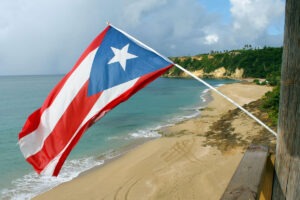
February 8, 2019; American Prospect
The first major debt restructuring in Puerto Rico is now final. The debt involved, known as COFINA—Corporación del Fondo de Interés Apremiante, or Urgent Interest Fund Corporation)—was incurred supposedly to fund development in Puerto Rico, but much of it simply refinanced older debt. COFINA was responsible for 24 percent or $17.5 billion of Puerto Rico’s debt. Puerto Rico’s total debt is estimated to be $72 billion.
Senior bond holders, many of them hedge funds, will receive 93 cents on the dollar. Junior bond holders, many of them Puerto Rican citizens, will receive a little under 55 cents on the dollar. All told, 68 percent of the debt was restructured, while nearly a third was written off. Meanwhile, Puerto Rican taxpayers will commit 54 percent of sales tax revenues to bond repayments for the next 38 or 39 years (depending on the bond). Effectively, 5.5 cents out of every dollar spent on taxable items in Puerto Rico will now be dedicated to repay bondholders.
The news is grim. Still, by spreading payments over more years and reducing debt, the maximum annual payment to bondholders falls from $1.85 billion a year to $992 million a year, according to Hazel Bradford of Pensions & Investments. Because sales tax revenues had been held until an agreement was reached, government annual revenues will now rise by $425 million.
Still, debt remains a major obstacle to recovery. Eric LeCompte, who directs Jubilee USA, a network of community and faith-based organizations, tells Bradford that, “The math isn’t adding up. If plans to restructure the remaining debt fail to cut the majority of the island’s debt load, Puerto Rico can’t see sustained economic recovery and growth.”
Juan Dalmau Ramírez, a senator in the Puerto Rico legislature, said to El Vocero that the accord “basically mortgages Puerto Rico for the next 40 years.” Speaking to Foro Noticioso, Puerto Rico teachers’ union president Mercedes Martínez Padilla complained that the accord “has the effect of converting the debt of the vultures [hedge funds] into a guarantee.”
Sign up for our free newsletters
Subscribe to NPQ's newsletters to have our top stories delivered directly to your inbox.
By signing up, you agree to our privacy policy and terms of use, and to receive messages from NPQ and our partners.
It is worth recalling that Puerto Rico declared bankruptcy on May 3, 2017—over four months before hurricane Maria. Technically, as NPQ’s Cyndi Suarez points out, this was a restructuring under Title III of PROMESA (Puerto Rico Oversight, Management and Economic Stability Act).
Some thought the tremendous loss of life and infrastructure wrought by Maria would result in large-scale debt forgiveness. Initially among them was President Donald Trump, who told Fox News that “Puerto Rico owes “a lot of money to your friends on Wall Street, and we’re going to have to wipe that out.” Trump’s comments were quickly walked back. Still, Dennis and Connor note that subordinated bond prices averaged “15 cents on the dollar between October 2017 and April 2018,” which reveals how much debt write-off many anticipated. Obviously, investors will do better—and Puerto Rico worse.
One winner, note Dennis and Connor, is GoldenTree, “the hedge fund which most aggressively took advantage of Hurricane Maria” by buying up junior debt. They add that if GoldenTree purchased the debt at 15 cents on the dollar, “they will make almost $160 million in profit on post-Maria investments alone.”
Other hedge funds will also profit. Dennis and Connor write that, “Several hedge funds invested heavily in COFINA senior bonds back in 2015, when the credit of Puerto Rico was already downgraded.” One was Baupost Group, a Boston-based fund headed by billionaire Seth Klarman, who, they estimate, bought $900 million in COFINA bonds that year, which “were trading at around 55 cents on the dollar at that time. If Baupost paid that price, the 93-percent recovery will translate into $170 million in profit for its 2015 senior investments alone.”
Hedge fund investors also benefit. As Dennis and Connor explain, “These include public-sector worker retirement systems, university endowments, and foundations.” Baupost, for example, counts Harvard and Yale as clients, who will now profit at the expense of Puerto Ricans.
COFINA is the first debt accord, but surely not the last. The largest ones, note Dennis and Connor, will involve Puerto Rico’s general obligation bonds and the Puerto Rico Electric Power Authority (PREPA), with additional Puerto Rican tax burdens and electricity charges likely outcomes. One bright spot, Dennis and Connor note, is that the PROMESA board has sought a court ruling “to declare $6 billion in general obligation bonds null and void because they violated the constitutional debt limit.” It’s less than a tenth of the total debt, but every bit helps.—Steve Dubb













